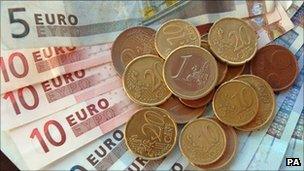Eurozone wants Greek private sector debt deal in days
- Published

The talks with private creditors could impact the future of the euro
Eurozone finance ministers meeting in Brussels have called on Greece to reach a deal with its private sector creditors "in the next few days".
They said creditors must accept a lower rate of interest on loans to Greece than the 4% they had offered.
Ministers confirmed that 130bn euros (£108bn) was available for the country.
However, they called for Greece to accelerate structural reforms to strengthen its economy and growth before funds would be released.
The group, headed by Luxembourg's Prime Minister Jean-Claude Juncker, said Greece's future was within the euro.
"We welcome the increased convergence and ask the Greek government to reach in the next few days a common understanding on the main terms and conditions of the PSI [private sector involvement] offer," said Mr Juncker early on Tuesday.
Lower rates
The eurozone finance ministers announced that it expected Greece's private sector creditors to accept a nominal 50% cut to the value of the loans they have made to Greece.
It also made clear it backed Greece in its negotiations with private lenders over the rate of interest it should pay on new bonds that will replace existing bonds held by creditors.
"Ministers asked their Greek colleagues to pursue negotiations to bring the interest rates on the new bonds to below 4%, which implies the interest comes down to well below 3.5%," Mr Juncker said.
Without a deal, Greece will not receive the bailout funds it needs to make billions of euros of loan repayments in March.
"The goal is to reduce the debt from 160% of GDP now to about 120% by the end of the decade," said the BBC's Europe correspondent, Chris Morris.
"The current offer, which representatives of the banks had suggested was final, would not achieve that goal."
Ministers also called on the Greek government and the so-called troika - the European Commission, European Central Bank and the IMF - to agree the key parameters of an "ambitious" adjustment programme as soon as possible.
EFSF downgrade
In the same announcement, Klaus Regling, chief executive of the European Financial Stability Facility said the fund's recent downgrade by rating agency S&P would not affect it.
The body was set up to provide financial assistance to stricken eurozone countries.
Mr Regling said the downgrade applied only to the fund's long-term credit rating and did not affect its short-term ability to act.
He said that out of three major agencies, only one had downgraded the fund and that the other two, Moody's and Fitch, had indicated that no downgrade was imminent.
Mr Regling pointed out that the fund had successfully auctioned debt on the day after the downgrade and described market reaction to the downgrade as "limited".
The fund's 440bn euro capacity was not reduced by the downgrade and the EFSF has sufficient means to support eurozone countries until the introduction of the European Stability Mechanism in July, he said.
Separately, IMF boss Christine Lagarde has said the eurozone needs economic growth and bigger financial firewalls to resolve debt issues.
Greek deadline
The Institute of International Finance (IIF), which represents Greece's private sector creditors, said a technical team would continue to work further on the details of a deal to cut the value of its debts.
European leaders agreed in principle last year that private lenders would voluntarily write off 50% of their loans to Greece, but private creditors still need to agree to the terms of the deal.
The 130bn euro rescue package from the EU and IMF is crucial if Greece is to meet its next debt repayment deadline in two months.
Without the second bailout Greece will not be able to pay back 14.5bn euros in maturing bonds in March.
If Greece defaults on its debts it could cause further economic havoc in the eurozone, and undermine the common currency.
'Solvency crisis'
Christine Lagarde met German Chancellor Angela Merkel in Berlin on Monday.
After the meeting, Ms Lagarde said that the eurozone needed a "larger firewall" to prevent the debt crisis spreading.
She added there was risk of a global economic spiral reminiscent of the 1930s unless definite action was taken on the eurozone crisis.
"Without it, countries like Italy and Spain that are fundamentally able to repay their debts could be forced into a solvency crisis by abnormal financing costs," she said.
She suggested "folding" money left in the eurozone's bailout fund, the European Financial Stability Facility, into the new European Stability Mechanism bailout fund, when the latter comes into force some time this year.
She also said the European Central Bank should "provide the necessary liquidity support to stabilise bank funding and sovereign debt markets."
And she repeated her view that "across-the-board, across-the continent, budgetary cuts will only add to recessionary pressures".